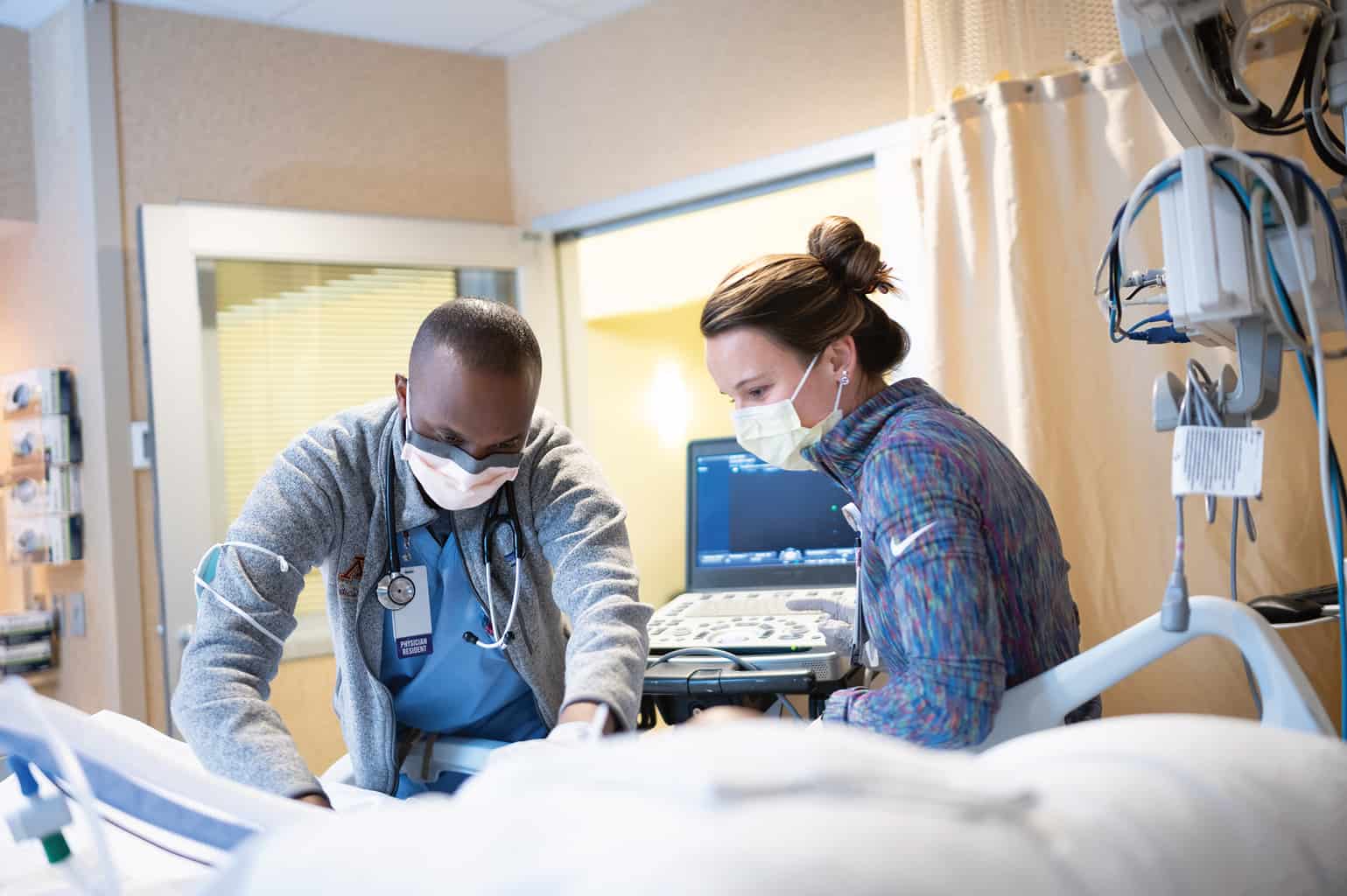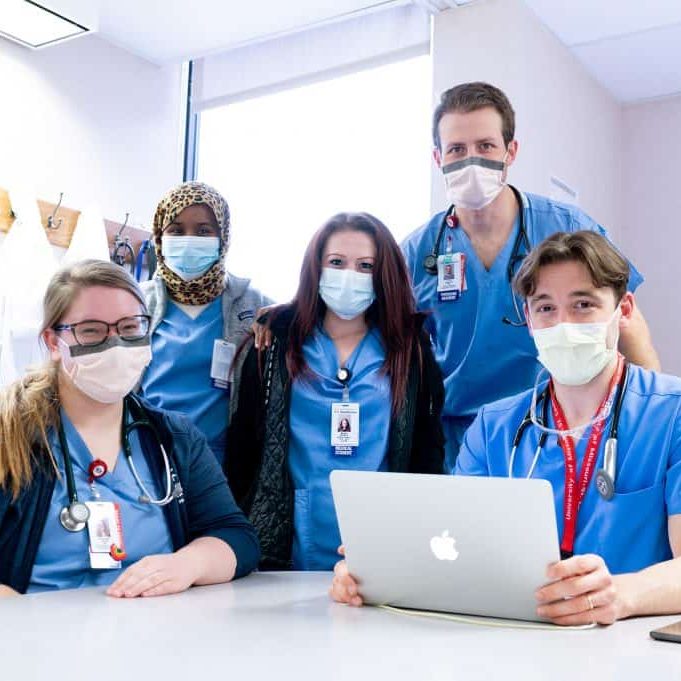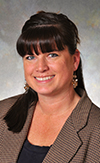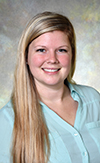
Internal Medicine Residency
Tracks in Primary Care and Global Health
Excellent fellowship placement and ABIM exam pass rates
Clinical research opportunities
Team-based care, with inpatient geographic units and multidisciplinary rounds
Comprehensive bedside ultrasound curriculum
Innovative primary care models which address social determinants of health
Strong commitment to resident wellness
About Our Program
Residents are the heart and soul of Hennepin. They lead ward and consult teams, run codes, field urgent calls from nurses, drive quality improvement, promote innovation in education and health care delivery, and further our mission of social justice. Hennepin residents were proud to care for patients with COVID-19, with preparation, guidance, and partnership from faculty.
Hennepin residents are hands-on learners who want ownership over medical decisions early in training. They are passionate about internal medicine and caring for vulnerable populations. Hennepin is both a nationally-renowned Level I Trauma Center serving patients from all corners of Minnesota, and a safety net hospital for Hennepin County. Residents care for immigrants, patients with complex medical illnesses and social determinants, and patients struggling because of discrimination, mental illness, addiction, and other conditions rooted in poverty, racism, and trauma.
Hennepin faculty have appointments at the University of Minnesota. Our curriculum includes large and small group teaching, simulation, ultrasound, and procedural training, online learning, and research opportunities. Trainees work in a collegial environment, with support and mentorship from faculty, peers, pharmacists, social workers, nurses, and other staff. They build clinical skills and meet milestones as part of a mission-driven, caring community.
About Our Curriculum
We believe in challenging, meaningful learning that sticks. Residents work side-by-side with faculty as part of a strong and unified community while asserting their unique voices and pursuing individualized goals. We offer protected weekly didactics, ultrasound and procedural education, and daily case-based conferences.
Innovations
Hennepin’s internal medicine residency was part of an ACGME collaborative (the Educational Innovations Project) for a decade, which led to the permanent restructuring of resident clinics. Ward teams were geographically reorganized more recently, facilitating resident-led multidisciplinary rounds which have improved communication and outcomes, reduced harms, and become a model for other services.
Rotations
All residents rotate in the ICU, on cardiac and general medicine wards, and on teams dedicated to dialysis and renal transplant patients. Residents experience the full breadth of subspecialties on consult services and work in the ED and on Night Float teams. Each resident has elective time for research or tailored learning every year.
Fellowships
Hennepin has several primary fellowships: Critical Care, Cardiology (shared with Abbott Northwestern Hospital), Geriatrics, Informatics, and Nephrology (shared with the Minneapolis VA). Hennepin is a teaching site and partner for additional subspecialty fellowships based at the University of Minnesota.
Residents sit on committees and contribute to decisions which affect their work. Many become interested in fellowships and in advancing knowledge through research and QI, with access to broad resources in these areas. Residents seeking competitive fellowships take advantage of research infrastructure and are supported to publish and present their work. Hennepin faculty sit on fellowship committees, both internally and at the University of Minnesota.
Research Infrastructure
Interns complete on-line Human Subjects Research training and learn about Hennepin’s IRB. Faculty present research opportunities to interns at an annual conference, and become mentors and advisors. Our Vice Chief for Mentorship, Education and Scholarship, Mark Linzer, APD Sam Ives, and research librarian Danielle Becker help residents build skills and are available to review and critique resident abstracts and manuscripts. Elective time can be used for projects.
Additional scholarly resources include Hennepin’s Analytic Center for Excellence, which provides database and statistical support for resident projects; the Virtual Data Warehouse (an EPIC database shared with the University of Minnesota); and the Hennepin Healthcare Research Foundation (HHRF). The HHRF is the third-largest nonprofit medical research organization in Minnesota, and in the top 10% of all institutions nationally in NIH funding. HHRF focus areas include TRAUMA/ACUTE CARE, HIV/INFECTIOUS DISEASES, ADDICTION, and HEALTHCARE DELIVERY. The HHRF also manages the nation’s solid organ transplant registry (Scientific Registry of Transplant Recipients) and end-stage renal disease database (United States Renal Data System).
Didactic Opportunities
Morning Report
Chief residents run interactive, case-based sessions focused on deductive reasoning in diagnosis, interpretation of physical exam, review of ultrasound, imaging and laboratory studies, and generation of a nuanced differential diagnosis. Residents can attend virtually or in-person, with social distancing.
Conferences
Our noon Emergencies in Medicine series occurs every summer after new interns arrive. Case-based subspecialty conferences, M&M, Resident Journal Club, CPC and research conferences, Medicine Clinic Education sessions, imaging and procedural conferences, Schwartz Rounds, and Dept. of Medicine Grand Rounds occur throughout the academic year. Residents can attend virtually or in-person.
Weekly Friday School
Interns and senior residents have separate protected sessions from noon to 2 PM every other Friday. Clinical core curriculum topics, racism, and disparities, imaging, and procedures, palliative care, EBM, cost-conscious care, wellness and resiliency, simulation, and code training are covered. Residents are encouraged to attend in person, with social distancing, or can attend virtually.
Primary Care Curriculum, Clinic Immersion, Johns Hopkins Ambulatory Curriculum, and Integrative Medicine
- Primary Care Curriculum is a pre-clinic small group session led by general internist faculty. Interactive, case-based sessions focus on evidence-based management of common outpatient diseases and foster collaborative learning and teaching.
- 6-7 interns rotate through Continuity Clinic Immersion one of the first three blocks of intern year, where they learn about the social determinants of health, ambulatory topics and critical appraisal. There are wellness activities, including a Wellness Workshop and Teaching Kitchen.
- Residents have protected time to complete online Johns Hopkins Internal Medicine Ambulatory Curriculum modules during training
- Residents interested in Integrative Medicine can complete a modular curriculum built by the University of Arizona, with mentorship from faculty
Simulation
Hennepin’s Interdisciplinary Simulation and Education Center is used for case-based teaching about codes, cardiovascular, and neurologic emergencies. Task trainer sessions provide opportunities to practice a wide variety of procedures. Residents can also develop teaching skills through curriculum design, creating, and precepting simulation scenarios.
Bedside Ultrasound
Each ICU and floor team has its own Butterfly Ultrasound. Group teaching occurs during clinic immersion, noon conferences, and Friday School. In-person practice in the Simulation Center, ICU, and wards emphasizes assessment of global cardiac function, pericardial abnormalities and IVC/volume status. Residents can also work independently with echocardiogram technologists to further build skills. An online CME course created by Hennepin’s Emergency Medicine faculty covers all clinical uses of bedside ultrasound and is freely available to residents.
Global Health Course
The University of Minnesota holds an annual global health course, accredited by the American Society of Tropical and Travel Medicine, every May. Online learning, in-person lectures from infectious disease experts, public health officials, and leaders of major aid organizations, simulation training and applied lab work are included in the curriculum. Residents who complete the course can earn a nationally-recognized Certificate of Knowledge in Clinical Tropical Medicine and Travelers’ Health.
About Our Faculty
The Department of Medicine at Hennepin Healthcare has over 160 faculty from all disciplines of internal medicine. These experienced physicians and teachers choose to work at Hennepin because of our patient population and their long-term commitment to education. Faculty are here for the same reasons as residents: to learn together and help those in need. Most work clinically, others are basic or clinical scientists.
Many faculty are nationally recognized as leaders in their fields, active in research, teaching and patient care. All hold appointments at the University of Minnesota Medical School in addition to faculty positions at Hennepin Healthcare.
Program Leadership
- Dr. Rosemary Quirk, Program Director, Internal Medicine Residency at Hennepin Healthcare and Assistant Professor at the University of Minnesota
- Dr. Michael Lawson, Associate Program Director, Internal Medicine Residency at Hennepin Healthcare and Assistant Professor at the University of Minnesota
- Dr. Sam Ives, Associate Program Director, Internal Medicine Residency at Hennepin Healthcare and Assistant Professor at the University of Minnesota
- Dr. Jessica Oswald, Associate Program Director, Internal Medicine Residency at Hennepin Healthcare and Assistant Professor at the University of Minnesota
- Dr. Charles Reznikoff, Associate Program Director, Internal Medicine Residency at Hennepin Healthcare and Assistant Professor at the University of Minnesota
- Dr. Brian Yablon, Associate Program Director, Internal Medicine Residency at Hennepin Healthcare and Assistant Professor at the University of Minnesota
Global Health / Primary Care Pathways
We offer two pathways in our residency for more focused training in primary care and/or global health. These do not require a separate match. The entry is determined by the application after the match.
Global Health Pathway
Since 2006, HCMC and the University of Minnesota have collaborated to teach medical trainees about illnesses and health care delivery in refugee, immigrant and migrant communities in America, and in low-resource countries. Through didactic coursework and direct clinical exposure, residents learn about healthcare disparities, care for diverse populations locally and abroad, benefit from collaboration and learning across sites, and receive mentorship and guidance about careers in international medicine.
Key Components
- Global Health Course: Online and in-person coursework is available through the University of Minnesota Medical School and School of Public Health. Topics pertinent to working overseas and with immigrant and refugee populations in the US are covered. Find the syllabus on the University of Minnesota Global Health page. The course is offered yearly in May and is a pre-requisite for taking a national certifying exam in tropical and travel medicine.
- Global Health Curriculum: Hennepin supports a diverse community of residents, faculty, and staff and provides health care to the largest number of refugees and immigrants in Minnesota. On-site educational opportunities include global health conferences and morning reports, a Migrant Worker Elective, and small-group meetings with global health faculty and residents.
- International Rotations: Selected residents may spend one 4-week rotation overseas, typically during PGY-3 year. There are multiple established, well-supervised international sites available through Hennepin and the University of Minnesota, however residents can also explore independent options. Past rotation sites include Cameroon, Costa Rica, El Salvador, Kenya, Madagascar, Nepal, Pakistan, Peru, South Africa, Bangalore, and Tanzania. Pathway participants can also take advantage of institutional relationships between the University of Minnesota and Chiang Mai University in Thailand, and Makerere University in Kampala, Uganda.
Primary Care Pathway
Launched in 2010, the Primary Care Pathway provides targeted training and career development for residents interested in primary care. The curriculum focuses on outpatient management for urban and underserved patient populations. This pathway accepts 2-3 residents per class, post-match. Participants should be interested in working as primary care providers after residency.
Key Components
- Pathway residents spend 4-5 months each year in the ambulatory setting, including three months on primary care blocks with a weekly academic half-day and extra continuity clinics
- Core clinical experiences include Healthcare for the Homeless, community-based primary care at Brooklyn Park, outpatient subspecialty rotations, Addiction Medicine and Pain clinics, Travel Medicine, breast cancer surgery clinic, ambulatory procedural workshops, and health education for Hennepin County Jail inmates
- Primary Care Forum is a weekly, half-day educational session about primary care topics, practice management, critical appraisal of the literature, EBM, and leadership development. The forum incorporates didactic and self-directed learning. Faculty from various specialties provide teaching and hands-on procedural training.
- Primary Care Pathway residents participate in a breakfast Book Club with guided discussions. Previous books have ranged from Being Mortal by Atul Gawande, to American Pain by John Temple.
What Sets Us Apart?
Multi-Cultural Perspective
Hennepin Healthcare serves diverse patients who speak dozens of languages, and provides multi-modal interpreter services to help in this effort. Residents interested in global health take advantage of international electives to learn more about health care delivery in countries like Nepal, Papua New Guinea, Thailand, Peru, Laos, Cameroon, Pakistan, and South Africa.
Clinical Research
Our residents work within existing clinical trials, publish abstracts and articles in top journals, and present scholarly work at regional and national meetings. Faculty mentorship, databases, statistical support, research skill-building, and other scholarly resources are available to accommodate every interest and experience level.
Simulation, Bedside Ultrasound and Procedural Training
We have a state-of-the-art Simulation Center with task trainers for a wide variety of procedures, as well as online and in-person resources for learning and mastering bedside ultrasound and developing competency in line placement, paracentesis, thoracentesis, and other procedures.
Employment and Fellowship Opportunities
Roughly half of our graduates go on to fellowships and match in competitive programs across the country. Our primary care and hospitalist graduates are in high demand for challenging clinical positions.
Focus on Wellness
Compared to national statistics, our internal medicine residents have less burnout and high rates of peer support, job satisfaction and appreciation, which we’ve been measuring annually since 2014.
Primary Care Track
Our Primary Care pathway allows residents to rotate at additional outpatient sites, further develop ambulatory procedural skills, and receive focused education in chronic disease and practice management.
Application Requirements
We consider applications and extend interviews beginning in early October. You are encouraged to apply by October 1st, however, applications will be accepted through November 15th. Submit your application through the Electronic Resident Application System (ERAS). Detailed requirements for our program are located in ERAS. We take into account Medical School Performance Evaluations, medical school transcripts, letters of recommendation from supervising faculty, USMLE and/or COMLEX scores, research and volunteer work, your personal statement and career goals when selecting candidates to interview.
International Medical Graduates
Internal applicants are welcome to apply. Hennepin Healthcare sponsors the J1 visa only. International graduates must meet the following requirements with no exceptions:
- Have at least twelve weeks U.S. inpatient clinical experience at a U.S. academic teaching hospital (observerships considered)
- Submit 2-3 letters of recommendation from faculty who supervised inpatient rotations
- Achieve a score of 220 or higher with a first-time pass on USMLE steps 1, 2, and CS
- Apply within five years of medical school graduation
Process
- Submission: Submit your application through the Electronic Resident Application System (ERAS). HCMC participates in the National Resident Match Program (NRMP).
- Interviews: Selected applicants will be invited for interviews, which are held from late October until late December.
About Our Facility
Hennepin Healthcare is a Level 1 Adult and Pediatric Trauma Center, with a campus spanning five city blocks in downtown Minneapolis. We have the busiest Emergency Department in the region, as well as a brand new ambulatory building for all outpatient surgeries and procedures. In the past ten years, the MICU, SICU, Burn Unit, dialysis unit, Rapid Treatment Unit for observation patients and Simulation Center were either rebuilt or renovated.




